#literary fame
Text

Wordsworth would be so pleased to see these daffodils every spring!
#William Wordsworth#Grasmere#Cumbria#Lake District#UK#English villages#English poets#daffodils#springtime#poetry#literary fame#gravestone#churchyard#literacy#The Daffodils
113 notes
·
View notes
Text
i see lord byron has been editing percy shelley's wikipedia page again
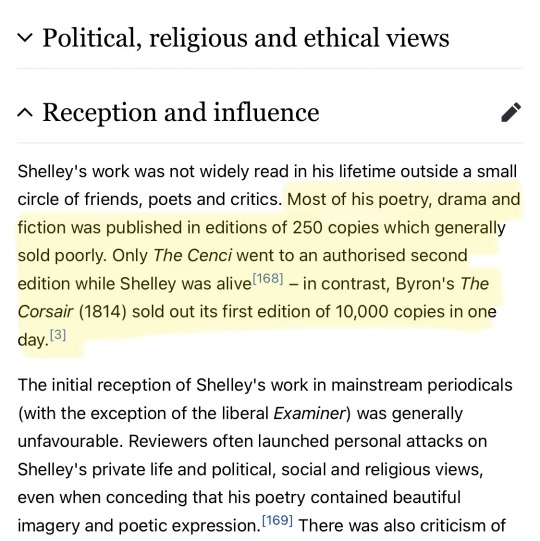
#they didn’t have to roast him like that#funny#but sad#but funny#this is sadder knowing he envied byron’s fame & then hated himself for it omg#& it appears byron either didnt know OR chose to not mention it due to awkwardness#torturing myself by reading about how shelley tortured himself#percy shelley#lord byron#literature#english literature#poetry#literary history#history#the romantics#romanticism#romantic literature#byronposting#percy posting
121 notes
·
View notes
Text
that post that's like "you need to have a varied media diet or you will turn into the kind of guy who runs a su discourse blog" is so right. keeping old mutuals is crucial too, like i might be into silly kids-friendly RPG n°17 at the moment, but the "if you write this it means you condone bad things in real life!!" discourse rings pretty hollow when half my dash is still discussing cannibalism
#of course this isn't a moral obligation if certain topics disturb you do what's best for you to curate your experience yadda yadda#that goes implied#this post is prompted by my old pal aidan of the terror (2018) fame putting a post discussing the literary and poetical uses#of *necrophilia* on my dash. gothic lit fans. gotta love em#wish i could say ''give me a heads-up man'' but it's not like i was expecting to filter it before LMAOOOOO#(aforementioned pal is also the cannibalism guy. there's a very crass joke to make here about eating meat but i am not gonna say it lolol)
234 notes
·
View notes
Text
I've seen enough of it at close quarters to know that fame, renown, notoriety - call it what you will - well, it's nothing but a curse that breeds misery. Especially to those of a creative or artistic bent.
For many years I have observed that the truly talented are invariably the most sensitive, and the public arena, where artifice is all that really matters, is no place for poets, and furthermore the critics, most of whom don't know their bumholes from their earlobes when it comes to the written word, think everyone - private life and all - is fair game. Yes, the public arena is no place for those of, shall we say, a sensitive disposition.
No poet should be famous - only read.
Benjamin Myers, The Offing
3 notes
·
View notes
Text
when mcr girls misspell gerard as girard
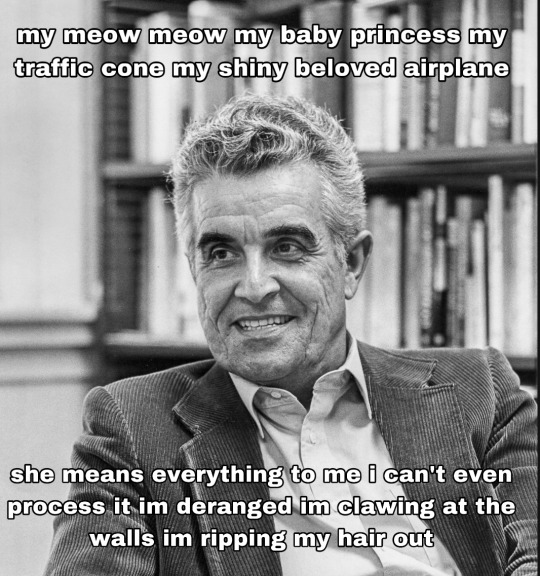
#that’s a photo of famed french polymath historian literary critic and philosopher of social science rene girard#if you even care.#samael speaks
7 notes
·
View notes
Text



2022/12/10
Terminamos la visita saliendo enfrente de una escuela de arte donde tenían imágenes de textos literarios. Nos dirigimos al paseo de la fama para ver las estrellas que dedicaron a un gram actor internacional que empezó su exitosa carrera rodando en la provincia y un director de cine español.
We ended the visit by leaving in front of an art school where they had images of literary texts. We headed to the Walk of Fame to see the stars dedicated to a great international actor who began his successful career filming in the province and a Spanish film director.
Google translation into Italian:
Abbiamo concluso la visita uscendo davanti ad un liceo artistico dove avevano immagini di testi letterari. Ci siamo diretti alla Walk of Fame per vedere le stelle dedicate a un grande attore internazionale che ha iniziato la sua carriera di successo girando in provincia e a un regista spagnolo.
Google Translation into French:
Nous avons terminé la visite en partant devant une école d'art où l'on disposait d'images de textes littéraires. Nous nous sommes dirigés vers le Walk of Fame pour voir les étoiles dédiées à un grand acteur international qui a commencé sa carrière réussie en filmant dans la province et à un réalisateur espagnol.
Google Translation into Portuguese:
Terminamos a visita saindo em frente a uma escola de arte onde tínhamos imagens de textos literários. Seguimos para a Calçada da Fama para ver as estrelas dedicadas a um grande ator internacional que começou sua carreira de sucesso filmando na província e a um diretor espanhol.
Google Translation into Arabic:
أنهينا الزيارة بالمغادرة أمام مدرسة فنون حيث كانت لدينا صور لنصوص أدبية. توجهنا إلى ممشى المشاهير لمشاهدة النجوم مكرسين لممثل دولي عظيم بدأ حياته المهنية الناجحة في التصوير في المقاطعة ولمخرج إسباني.
Google Translation into German:
Wir beendeten den Besuch, indem wir vor einer Kunstschule abreisten, wo wir Bilder von literarischen Texten hatten. Wir gingen zum Walk of Fame, um die Sterne zu sehen, die einem großen internationalen Schauspieler gewidmet sind, der seine erfolgreiche Karriere mit Dreharbeiten in der Provinz begann, und einem spanischen Regisseur.
Google Translation into Albanisch:
Vizitën e përfunduam duke u nisur përpara një shkolle artistike ku kishim foto me tekste letrare. Ne shkuam në Walk of Fame për të parë yjet kushtuar një aktori të madh ndërkombëtar që filloi karrierën e tij të suksesshme duke filmuar në provincë dhe një regjisori spanjoll.
Google Translation into Armenian:
Այցելությունն ավարտեցինք՝ մեկնելով արվեստի դպրոցի դիմաց, որտեղ ունեինք գրական տեքստերի նկարներ։ Մենք գնացինք Փառքի ծառուղի տեսնելու աստղերը, որոնք նվիրված են մեծ միջազգային դերասանին, ով իր հաջող կարիերան սկսել է նկարահանվելով նահանգում և իսպանացի ռեժիսորին:
Google Translation into Bulgarian:
Завършихме посещението, като тръгнахме пред училище по изкуства, където имахме снимки на литературни текстове. Отидохме на Алеята на славата, за да видим звездите, посветени на голям международен актьор, започнал успешната си кариера, снимайки в провинцията, и на испански режисьор.
Google Translation into Czech:
Návštěvu jsme zakončili odchodem před uměleckou školu, kde jsme měli obrázky literárních textů. Šli jsme na chodník slávy, abychom viděli hvězdy věnované skvělému mezinárodnímu herci, který zahájil svou úspěšnou kariéru natáčením v provincii, a španělskému režisérovi.
Google Translation into Croatian:
Posjet smo završili odlaskom ispred umjetničke škole gdje smo imali slike književnih tekstova. Otišli smo na Walk of Fame vidjeti zvijezde posvećene velikom međunarodnom glumcu koji je svoju uspješnu karijeru započeo snimajući u provinciji i jednom španjolskom redatelju.
Google Translation into Slovak:
Návštevu sme ukončili odchodom pred umeleckú školu, kde sme mali obrázky literárnych textov. Išli sme na chodník slávy, aby sme videli hviezdy venované veľkému medzinárodnému hercovi, ktorý začal svoju úspešnú kariéru natáčaním v provincii, a španielskemu režisérovi.
Google Translation into Slovenian:
Obisk smo zaključili z odhodom pred likovno šolo, kjer smo imeli slike literarnih besedil. Šli smo na Pločnik slavnih, da bi si ogledali zvezde, posvečene velikemu mednarodnemu igralcu, ki je svojo uspešno kariero začel s snemanjem v provinci, in španskemu režiserju.
Google Translation into Estonian:
Külastuse lõpetasime lahkumisega kunstikooli eest, kus olid pildid kirjandustekstidest. Käisime Walk of Fame'il vaatamas staare, kes on pühendatud suurepärasele rahvusvahelisele näitlejale, kes alustas oma edukat karjääri provintsis filmides, ja Hispaania režissöörile.
Google Translation into Suomi:
Päätimme vierailun lähtemällä taidekoulun eteen, jossa meillä oli kuvia kirjallisista teksteistä. Kävimme Walk of Famella katsomassa tähtiä, jotka on omistettu suurelle kansainväliselle näyttelijälle, joka aloitti menestyksekkään uransa kuvaamalla maakunnassa, ja espanjalaiselle ohjaajalle.
Google Translation into Greek:
Ολοκληρώσαμε την επίσκεψη φεύγοντας μπροστά από ένα καλλιτεχνικό σχολείο όπου είχαμε εικόνες από λογοτεχνικά κείμενα. Πήγαμε στο Walk of Fame για να δούμε τα αστέρια αφιερωμένα σε έναν σπουδαίο διεθνή ηθοποιό που ξεκίνησε την επιτυχημένη καριέρα του στα γυρίσματα στην επαρχία και σε έναν Ισπανό σκηνοθέτη.
Google Translation into Dutch:
We beëindigden het bezoek door voor een kunstacademie te vertrekken waar we foto's van literaire teksten hadden. We gingen naar de Walk of Fame om de sterren te zien die waren opgedragen aan een grote internationale acteur die zijn succesvolle filmcarrière begon in de provincie en aan een Spaanse regisseur.
Google Translation into Norwegian:
Vi avsluttet besøket med å gå foran en kunstskole hvor vi hadde bilder av litterære tekster. Vi dro til Walk of Fame for å se stjernene dedikert til en stor internasjonal skuespiller som begynte sin suksessrike karriere med å filme i provinsen og til en spansk regissør.
Google Translation into Polish:
Zwiedzanie zakończyliśmy wyjściem przed szkołę plastyczną, gdzie mieliśmy zdjęcia tekstów literackich. Poszliśmy do Walk of Fame, aby zobaczyć gwiazdy poświęcone wielkiemu międzynarodowemu aktorowi, który rozpoczął swoją udaną karierę filmową w prowincji oraz hiszpańskiemu reżyserowi.
Google Translation into Romanian:
Am încheiat vizita plecând în fața unei școli de artă unde aveam poze cu texte literare. Am fost pe Walk of Fame pentru a vedea vedetele dedicate unui mare actor internațional care și-a început cariera de succes filmând în provincie și unui regizor spaniol.
Google Translation into Russian:
Мы закончили визит тем, что вышли перед художественной школой, где у нас были фотографии литературных текстов. Мы отправились на Аллею славы, чтобы увидеть звезды, посвященные великому ��еждународному актеру, который начал свою успешную карьеру в провинции, и испанскому режиссеру.
Google Translation into Serbian:
Посету смо завршили одласком испред уметничке школе где смо имали слике књижевних текстова. Отишли смо на Стазу славних да видимо звезде посвећене великом међународном глумцу који је своју успешну каријеру започео снимајући у провинцији и једном шпанском редитељу.
Google Translation into Swedish:
Vi avslutade besöket med att ge oss av framför en konstskola där vi hade bilder på litterära texter. Vi gick till Walk of Fame för att se stjärnorna dedikerade till en stor internationell skådespelare som började sin framgångsrika karriär med att filma i provinsen och till en spansk regissör.
Google Translation into Turkish:
Edebi metinlerin resimlerinin bulunduğu bir sanat okulunun önünden ayrılarak ziyaretimizi sonlandırdık. Başarılı kariyerine eyalette film çekerek başlayan büyük bir uluslararası aktöre ve İspanyol bir yönetmene adanmış yıldızları görmek için Walk of Fame'e gittik.
Google Translation into Ukrainian:
Ми завершили візит, вийшовши перед художньою школою, де ми мали зображення літературних текстів. Ми пішли на Алею Слави, щоб побачити зірки, присвячені великому міжнародному актору, який розпочав свою успішну кар’єру, знімаючись у провінції, та іспанському режисеру.
Google Translation into Bengali:
আমরা একটি আর্ট স্কুলের সামনে রেখে পরিদর্শন শেষ করলাম যেখানে আমাদের সাহিত্য পাঠের ছবি ছিল। প্রদেশে এবং একজন স্প্যানিশ পরিচালকের কাছে তার সফল কেরিয়ারের চিত্রগ্রহণ শুরু করা একজন মহান আন্তর্জাতিক অভিনেতাকে উত্সর্গীকৃত তারকাদের দেখতে আমরা ওয়াক অফ ফেমে গিয়েছিলাম।
Google Translation into Chinese:
我们在一所艺术学校前离开,在那里我们有文学文本的图片,从而结束了这次访问。 我们去了星光大道,看星星献给一位伟大的国际演员,他在该省开始了他成功的职业生涯,并献给了一位西班牙导演。
Google Translation into Korean:
우리는 문학 텍스트의 그림이 있는 예술 학교 앞에서 출발하여 방문을 끝냈습니다. 우리는 지방에서 성공적인 촬영 경력을 시작한 위대한 국제 배우와 스페인 감독에게 헌정된 별을 보기 위해 명예의 거리에 갔다.
Google Translation into Hebrew:
סיימנו את הביקור ביציאה מול בית ספר לאמנות שבו היו לנו תמונות של טקסטים ספרותיים. הלכנו לשדרת התהילה לראות את הכוכבים המוקדשים לשחקן בינלאומי גדול שהחל את הקריירה המצליחה שלו בצילומים במחוז ולבמאי ספרדי.
Google Translation into Hindi:
हमने एक कला विद्यालय के सामने जाकर यात्रा समाप्त की, जहाँ हमारे पास साह��त्यिक ग्रंथों के चित्र थे। हम एक महान अंतरराष्ट्रीय अभिनेता को समर्पित सितारों को देखने के लिए वॉक ऑफ फेम में गए, जिन्होंने अपने सफल करियर की शुरुआत प्रांत में और एक स्पेनिश निर्देशक के लिए की थी।
Google Translation into Indonesian:
Kami mengakhiri kunjungan dengan pergi ke depan sebuah sekolah seni di mana kami memiliki gambar-gambar teks sastra. Kami pergi ke Walk of Fame untuk melihat bintang-bintang yang didedikasikan untuk aktor internasional hebat yang memulai karier syutingnya yang sukses di provinsi dan sutradara Spanyol.
Google Translation into Japanese:
私たちは文学作品の写真を持っていた美術学校の前を後にして、訪問を終えました。 私たちはウォーク オブ フェームに行き、この地方で成功を収めたキャリアをスタートさせた偉大な国際的俳優と、スペインの監督に捧げられたスターを見ました。
Google Translation into Kyrgyz:
Иш сапарды биз көркөм окуу жайынын алдынан чыгып, көркөм тексттердин сүрөттөрү менен аяктадык. Биз Даңк аллеясына провинцияда ийгиликтүү тасма тартууну баштаган эл аралык улуу актёрго жана испаниялык режиссерго арналган жылдыздарды көрүү үчүн бардык.
Google Translation into Malay:
Kami mengakhiri lawatan dengan meninggalkan di hadapan sebuah sekolah seni di mana kami mempunyai gambar teks sastera. Kami pergi ke Walk of Fame untuk melihat bintang yang didedikasikan untuk pelakon antarabangsa yang hebat yang memulakan penggambaran kerjayanya yang berjaya di wilayah itu dan kepada pengarah Sepanyol.
Google Translation into Panjabi:
ਅਸੀਂ ਇੱਕ ਆਰਟ ਸਕੂਲ ਦੇ ਸਾਹਮਣੇ ਰਵਾਨਾ ਹੋ ਕੇ ਯਾਤਰਾ ਦੀ ਸਮਾਪਤੀ ਕੀਤੀ ਜਿੱਥੇ ਸਾਡੇ ਕੋਲ ਸਾਹਿਤਕ ਪਾਠਾਂ ਦੀਆਂ ਤਸਵੀਰਾਂ ਸਨ। ਅਸੀਂ ਇੱਕ ਮਹਾਨ ਅੰਤਰਰਾਸ਼ਟਰੀ ਅਭਿਨੇਤਾ ਨੂੰ ਸਮਰਪਿਤ ਸਿਤਾਰਿਆਂ ਨੂੰ ਦੇਖਣ ਲਈ ਵਾਕ ਆਫ਼ ਫੇਮ 'ਤੇ ਗਏ ਜਿਸਨੇ ਪ੍ਰਾਂਤ ਵਿੱਚ ਆਪਣੇ ਸਫਲ ਕੈਰੀਅਰ ਦੀ ਸ਼ੂਟਿੰਗ ਸ਼ੁਰੂ ਕੀਤੀ ਅਤੇ ਇੱਕ ਸਪੈਨਿਸ਼ ਨਿਰਦੇਸ਼ਕ ਨੂੰ।
Google Translation into Pashtun:
موږ لیدنه پای ته ورسوله د هنر ښوونځي مخې ته چیرې چې موږ د ادبي متنونو عکسونه درلودل. موږ واک آف فیم ته لاړو ترڅو هغه ستوري وګورو چې یو لوی نړیوال لوبغاړي ته وقف شوي چې په والیت کې یې خپل بریالي کیریر فلم کولو پیل کړی او یو هسپانوي ډایرکټر ته.
Google Translation into Persian:
بازدید را با خروج از مقابل یک هنرستان که در آن تصاویر متون ادبی داشتیم به پایان رساندیم. ما به پیادهروی مشاهیر رفتیم تا ستارههای تقدیم شده به یک بازیگر بزرگ بینالمللی که کار موفق خود را با فیلمبرداری در استان آغاز کرد و یک کارگردان اسپانیایی را ببینیم.
Google Translation into Tagalog:
Tinapos namin ang pagbisita sa pamamagitan ng pag-alis sa harap ng isang paaralan ng sining kung saan mayroon kaming mga larawan ng mga tekstong pampanitikan. Nagpunta kami sa Walk of Fame para makita ang mga bituin na nakatuon sa isang mahusay na international actor na nagsimula sa kanyang matagumpay na career filming sa probinsya at sa isang Spanish director.
Google Translation into Thai:
เราจบการเยี่ยมชมด้วยการออกจากหน้าโรงเรียนสอนศิลปะซึ่งมีรูปภาพตำราวรรณกรรม เราไปที่ Walk of Fame เพื่อดูเหล่าดาราที่อุทิศให้กับนักแสดงระดับนานาชาติผู้ยิ่งใหญ่ซึ่งเริ่มต้นอาชีพที่ประสบความสำเร็จในการถ่ายทำในจังหวัดนี้และให้กับผู้กำกับชาวสเปน
Google Translation into Urdu:
ہم نے ایک آرٹ سکول کے سامنے جا کر دورہ ختم کیا جہاں ہمارے پاس ادبی تحریروں کی تصویریں تھیں۔ ہم ایک عظیم بین الاقوامی اداکار کے لیے وقف ستاروں کو دیکھنے کے لیے واک آف فیم گئے جس نے صوبے میں اپنے کامیاب کیریئر کی فلم بندی کی اور ایک ہسپانوی ہدایت کار کے لیے۔
#Almeria#España#Spain#Art#School#Visual#Literary#Walk#Fame#ArnoldSchwarzenegger#Conan#AlexDeLaIglesia#800Balas#PolloNegroSkyWalker#Travel#Beauty#CoupleGoals#GoodVibes#Plushies#Maharashtra#ペンギン
4 notes
·
View notes
Quote
What a thing to be in the mouth of fame.
John Keats
#fame#quote#life quote#quotes#john keats#famous#poetry#writers and poets#dark acadamia aesthetic#dark academia#spilled ink#literary#lit
3 notes
·
View notes
Text
"But you know public figures must be especially careful. Imagine the state of distrust in which I move through the world. Revealing anything shameful to anyone, I run the risk of exposure, censure, mockery. Everyone should be told this about fame before they start pursuing it: you will never trust anyone again. You will be a kind of damned person, not only because you can't trust anyone but, still worse, you must always be considering how important you are, how newsworthy, and this divides you from yourself and poisons your soul. It sucks to be well-known, Pip. And yet everyone wants to be well-known, it's what the whole world is made of now, this wanting to be well-known."
- Jonathan Franzen, Purity
0 notes
Text
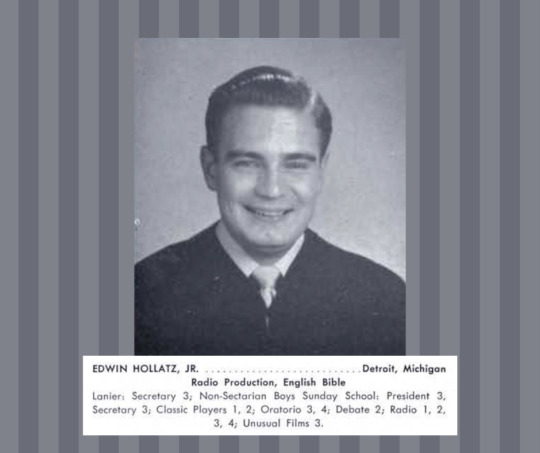
Edwin Arthur Hollatz Jr. made his debut on the stage of God’s earth May 31, 1930, in Chicago IL to parents Edwin Arthur Hollatz Sr., and Charlotte (Potter) Hollatz. One of his earliest memories around age 2 was of his parents having family devotions next to his crib before going to bed at night. Ed’s love of the Lord and the study of God’s Word is something that shaped him throughout his entire life.
It is no surprise that a 4-year-old who liked to pretend he was Dr. Ironside, preaching to imaginary congregants in his boyhood teepee, became a college professor who taught preaching and homiletics to others. Ed knew he was a vessel for God’s work and that the power of public speaking was key in helping the Word to become flesh - tangible and alive in the lives of the Wheaton College students he taught and led for 45 years.
Since childhood, his unique boyhood interests (opera, natural history, magic) laid the groundwork in shaping his curious mind and insatiable hunger for knowledge. A true “sponge for knowledge,” Ed’s interests were both deep and broad, culminating in a personal library of thousands of books across many topics. From chemistry to The Classics, from Biblical archeology to Bach, and from planetary science to playwrights, his books filled every square inch of the walls of his office, be it at Wheaton College or at home.
Edwin grew up in Chicago and then the family moved to Detroit when Ed’s father took a new job. Ed graduated from Thomas Cooley High School Detroit in 1948. From there he went to Bob Jones University, which was at that time the premier Christian program for the study of radio production and English Bible. After graduating from Bob Jones, Ed attended Wheaton College, earning his graduate degree in Bible and theology in 1955. Ed began teaching at Wheaton College while pursuing a second master’s degree in radio and television at Northwestern University. He also received his PhD in rhetoric and public address and speech pedagogy from Northwestern in 1965, finishing his dissertation just before the birth of his second daughter Celia. After that, he was hired as tenure-track faculty at Wheaton College and never looked back. Of note, Ed started Wheaton’s debate program (leading the students to national championships), the theater program which has now been going strong for 50+ years and was responsible for the growth of WETN from a glorified PA announcement system on campus to a full-licensed radio station.
Throughout his professional life, Ed’s rigorous mind complemented his enormous heart. For him, a life of the mind was fully embedded with what it means to live as a Christian. He once wrote, “the academic thoroughness of Wheaton has shown me beyond a shadow of a doubt that a Christian can and should be on par intellectually with the modern world. I believe that Christianity and ignorance are incompatible.”
In 1959 Ed met the love of his life, Joanne Simon, who was also a new faculty member at Wheaton College. They were married at College Church in 1960 and recently celebrated 63 years of marriage together. Joanne faithfully became Ed’s primary caregiver during his health challenges, starting with a myasthenia gravis diagnosis in 2014.
For almost 60 years, Ed was an active member of College Church. He gave of his time and talents in both music and leadership: he sang in the choir, was chairman of the music committee, led songs during evening services, chaired the organ and the constitution revision committees, and served as president of Keenagers. For Ed, music was worship and worship was music and he could sing any hymn and stanza up until the final weeks of his life.
Ed was called home to be with his Lord and Savior, Jesus Christ, on December 2, 2023 This was a homecoming he had been looking forward to his entire life. The great “hope that is within us” has now been made complete for him.
Ed is survived by his beloved wife, Joanne, his two daughters and their spouses (Celia & Chad Bergman; Cheryl Hollatz & Kate Gray), and his three grandchildren: Kendra Wisely (along with her father Andrew Wisely), Karina Bergman and Anderson Bergman, as well as his brother Richard Hollatz of Holland, Michigan.
Please join the family to honor Ed during visitation at Hultgren Funeral Home on Sunday December 10, 3-7 pm or Monday December 11, 10am – noon. A memorial service to honor Ed’s life will be held at the First Presbyterian Church of Wheaton on Monday, January 22, 2024 at 1:00 p.m. The service will be livestreamed beginning at 1:00 p.m. CST through this link: Memorial Service for Edwin Hollatz.
In lieu of flowers, donations in memory of Edwin Hollatz can be made to either: the Edwin A. Hollatz Endowed Scholarship at Wheaton College. Donations by check may be made out to Wheaton College and sent to Advancement Services, 501 College Avenue, Wheaton, IL 60187, or to the general missions fund at College Church, 332 E Seminary Avenue, Wheaton, IL 60187. For either memorial gift, please kindly note on the memo line that the gift is in memory of Edwin Hollatz.
#Bob Jones University#BJU Hall of Fame#2023#Obituary#BJU Alumni Association#Edwin Arthur Hollatz#Class of 1952#Wheaton College#PhD in Rhetoric#National Communication Association#“The Development of Literary Societies in Selected Illinois Colleges in the Nineteenth Century and Their Role in Speech Training”#Northwestern University
0 notes
Text
Unearthing Idyll | Dhara Parekh | Book Review
Publisher : Notion Press (10 February 2023)
Language : English
Paperback : 312 pages
Unearthing Idyll by Dhara Parekh is a futuristic novel where the two worlds run parallel to each other and open a dialogue about social identity, collectivism, and what it means to never fit into society. The introspective literary fiction pushed one to think harder and question their present as they…
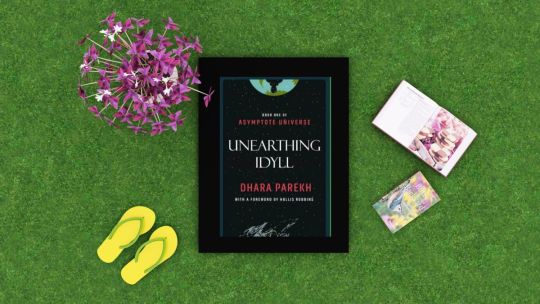
View On WordPress
#Book Recommendations#Book Reviews#Bookish Fame#Dhara Parekh#Literary Fiction#Science Fiction#Unearthing Idyll
0 notes
Text
My Last Innocent Year: A Review
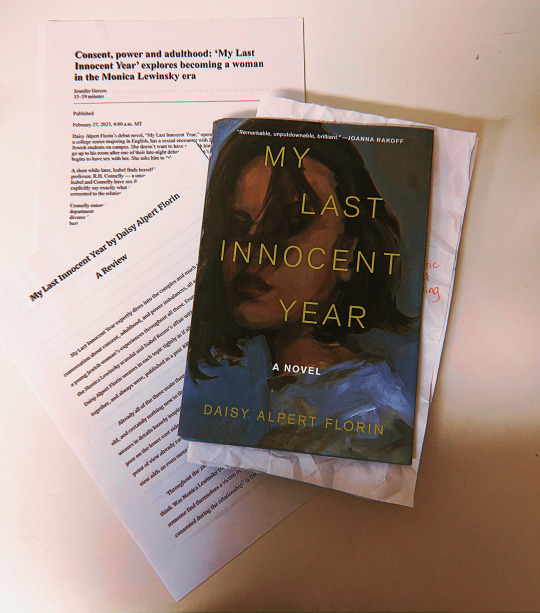
⭐⭐⭐⭐⭐
My Last Innocent Year expertly dives into the complex and much needed conversation about consent, adulthood, and power imbalances, all against the backdrop of a young Jewish woman's experiences throughout all three. From the inciting incident to the Monica Lewinsky scandal and Isabel Rosen's affair with her creative writing professor, Daisy Alpert Florin weaves in each topic tightly as if all of them are meant to be discussed together, and always were, published in a post #MeToo era of early 2023.
Already all of the three main themes being relatable to many women, young and old, and certainly nothing new to the world of dark academia literary fiction, Florin weaves in details loosely inspired by her own experiences, as a Jewish woman who grew up poor on the lower east side of New York, making her work stand out amongst the others. A point of view already rarely represented in any fiction genre in general, the Jewish point of view adds an even more realistic layer to the short novel.
Throughout the 288 pages, Daisy Alpert Florin asks the reader to think - to really think. Was Monica Lewinsky treated fairly? Is rape always physically violent? Can someone find themselves a victim of a power imbalanced relationship even if they consented during the relationship? Is there such a thing as a "perfect" victim of a sexual assault or coercion? Is linear growth really something that is possible after such instances, or even on the road from adolescent to adult?
My Last Innocent Year appears to be a book perfectly made for book club and class discussions, (in fact the author's website even has some info for book clubs to use) and every reader will find themselves discovering different questions to another reader - upon a reread they may find more or different questions from their first read through, and even then not all of the questions relate only to maturity and consent. Questions about being the perfect minority as a Jewish woman, why immigrant Jewish fathers want their children to become lawyers and doctors - is it because of the American Dream, or is it because they just want to know that when they eventually die, that their children will be able to take care of themselves? How do you have that conversation with your father? How do you safely and securely follow your artistic dreams, when do you draw the line at sacrificing your passions for your family, and sacrificing your family for your passions?
One of the most important questions I feel that was posed in this novel is - how do you know when you're an adult? Not age wise, not even technically physically or mentally developed into an adult, but how do you know when you're an adult, how do you know when you've reached a certain level of maturity that means you've "come of age"? Do you know in that moment, or only upon reflection?
With evocative and personal writing and details, I began to find that I was missing my own creative writing workshops from my earlier days in my undergrad, as well as other intensely personal parallels from people in my own life to the characters that surrounded Isabel, and parallels between myself and Isabel, even if I was a Jewish woman raised in a home that didn't have to worry about money nor in New York, there were still many parallels I could see and feel throughout my experience reading this book.
Don't let the short page count fool you into believing this is an easy or even a quick read. It's serious. It's dark, it's heavy. All of the topics and events of the late 1990s fitting into one book of under 300 pages - it feels thick and intense. A fast moving exploration of consent, Jewish identity, family, passion and sacrifice, Daisy Alpert Florin perfectly executes a rare, one of a kind addition to the literary fiction and dark academia genres, and I can't wait to see what she does next.
0 notes
Text


𝓶𝓪 𝓶𝓾𝓼𝓮 pt.1
ᵒᵇˢᵉˢˢᵉᵈ ᵃᵘᵗʰᵒʳ ˣ ᵇᵒᵒᵏʷᵒʳᵐ ʳᵉᵃᵈᵉʳ
⤷ note : pt.2 | moodboard
his presence lingered in every corner of the bookstore, name spoken in reverent tones by both staff and patrons alike. and who he might be? the literary virtuoso, Ren Takahashi, who recently emerged as a new generation fiction writer, standing as a towering figure in the realm of literature. despite being a new name in the writing community, he was quick to rise to fame with the release of his latest masterpiece, which depicted the story of a yearning painter desperately in search of his muse; the story mainly revolving around the theme of lovesickness.
being an avid book lover, it was not unusual for you to keep up with the latest updates in the community, be it newly released books or the newly emerging writers. for you, Ren was not an unfamiliar name but you never really felt truly drawn to any of his writings, which often tended to revolve around a similar theme of infatuation and obsessive love.
as you made your way through the aisles, you couldn't help but notice the prominent display of his new novel on the central shelf, the vibrant red cover drawing you in. opening the glass panel, you carefully took the book out. as you started to read, your expression quickly shifted with eyebrows furrowing into concentration as your lips curled into a smile of intrigue. turning the pages with a gentle flutter, you seemed to absorb each word presented before you. completely enamoured by the book, you failed to notice the presence of an unknown figure, leaning against the opposite bookshelf, eyes longingly staring at your small figure
"so, do you like the book?", the figure softly spoke out, careful not to startle you while clearing his throat in the process.
needless to say, you were a bit startled at first but the gentleness of his voice oddly managed to calm you down almost instantly. you were never really much of a talker, thanks to your introverted nature and not wanting to make this interaction any awkward, you just found it easier to nod your head in response. your eyes were still fixated on the pages, only to look up at the figure once you were satisfied with thorough scanning of the book. infront of you stood the most gorgeous men you have ever laid your eyes upon in your 23 years of living. luscious long hair tressed a shadowy cascade against his pale porcelain skin, hazel eyes twinkling under the bright store lighting as his 6'2 figure stood towering over you, leaning against the wooden shelf in a relaxed stance.
a shade of pink subconsciously coated your cheeks, as you struggled to maintain eye contact with the handsome stranger.
"do you come here often ?", his velvety voice echoed in your ears, slowly luring you in like a siren's song. at the sudden loss of words, all you could do was nod at his question in agreement.
noticing your flustered state, he chuckled softly, silently taking in your adorable expression and soft features.
"say, would you like to have a cup of coffee with me at the nearby cafe? I've heard their pastries are quite popular here"
the proposal was unexpected. especially coming from someone like him; someone as beautiful as him. you were average to say the least, easily passing as just another face in the crowd. why would he want someone like you?
quickly snapping out of your trance, you politely denied his offer with a firm "no". but why? didn't you like him too? the dejected look in his eyes reminded you of a lost puppy. concealing the pain with a fake smile, he handed you his number in a piece of paper, telling you to call him if you ever wanted to talk or had a change of heart regarding your little coffee date. or he could just show up at the bookstore to meet you again? you wouldn't suspect anything, right? it'll just be another coincidence, after all! ♡
with a seemingly disinterested look, you took the paper out of his hand, only to catch a quick glimpse of something that caught your eyes.
"(555) 867-xxxx
- Ren Takahashi "

#yandere scenarios#yandere imagines#yandere oc#male oc#yandere male x reader#yandere#yandere oc x reader#yandere boyfriend#yandere prompt#yandere insert#yandere fic#yandere x reader#yandere male x you#x gender neutral reader#x reader#x reader insert#gn reader#mochiii.writes#divider creds: cafekitsune
288 notes
·
View notes
Text
Jane Austen & the South Downs cottage...
I know the idea of Aziraphale already owning the South Downs cottage is a pretty commonly-discussed thing but I don't know if this aspect of it has been. Apologies if it has. I think S2 might possibly be hinting at the idea of the South Downs cottage maybe having ties to Crowley & Aziraphale's past a bit via Jane Austen and the timeline and backstory they established for her.
In real life, Jane Austen lived the last 8 or so years of her life in the village of Chawton in Hampshire in the South Downs. She died pretty young, even for the time, in July 1817. Her books only became successful a few years prior to her death so much of her literary fame is posthumus. One of the reasons Crowley doesn't know she's a writer (still, somehow lol) is that it sounds like the era in which he knew Jane personally was prior to her becoming a famous writer.
Crowley says that he knows her as the brains behind "The 1810 Clerkenwell Diamond Robbery"-- an event that Good Omens made up but gave a year to that's kind of specific on the timeline of Jane Austen's real life history. Even though Clerkenwell itself is part of London, Jane Austen was living in the South Downs in 1810 when she was crossing paths with Crowley and Aziraphale, as she lived in Chawton from 1809 until her death in 1817. Since Aziraphale associates her with regency balls so quickly (and because there's no way that if we ever get a Jane Austen flashback after Aziraphale's whole ball/meeting in S2 that the flashback won't involve a Regency-era ball lol), it's likely that even if Jane was running her criminal empire through London, at least some of the setting of a flashback would be at a ball at a cottage (estate) in the South Downs.
This would then help to fill in how both Crowley and Aziraphale knew Jane Austen and know the other knew her (implying they were around her together at one point.) By 1810, Aziraphale is a wealthy London land owner and businessman. Does he get invited out to one of Jane Austen's balls or go with her group to one of her neighbor's ones, where he crosses paths with rakish Regency diamond thief Crowley? Does he spend half the night pretending not to moon over him, pining for a dance he doesn't get until 2023? (Probably safe to assume yes lol.)
Did he and Crowley have some romantic moment that night on an old estate in the South Downs-- or some significant near-miss of one-- and then Aziraphale just went and bought the cottage at some point a billion years ago and didn't tell Crowley because this is Aziraphale's 'maybe someday' pipe dream and he was never going to tell Crowley unless they'd evaded all possible Armageddons and there was a chance they could have this? Why disappoint Crowley more, right? And he doesn't tell him after S1 because they both know it's not really over so he just still hasn't as of S2 and that would set it up for being part of the end of S3.
It would be very sweet if the cottage isn't a new idea and was actually a place that has significance to them.
Crowley's been through a lot. Let him find out Aziraphale bought Pemberley for him in 1810.

#ineffable husbands#good omens#crowley#aziraphale#aziracrow#jane austen#good omens 2#south downs cottage
315 notes
·
View notes
Text
Sirens of Greek Myth Were Bird-Women, Not Mermaids
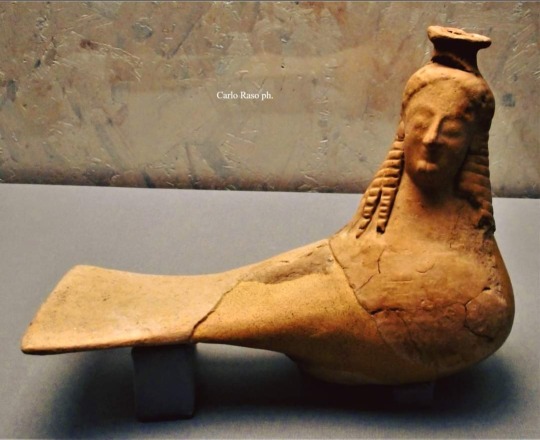
Bottle-askos in the shape of a siren (2nd half 6th century BC) from Locri / Southern Italy's Calabria. National Museum of Magna Graecia (Reggio Calabria, Italy).
In the wine-dark expanse of the Mediterranean Sea, far from the halls of civilization, there was once a small island—or so Homer, the famed poet of Ancient Greece, wrote in his epic The Odyssey. No buildings occupied its flowery meadows; no fisherman worked its shores. Those who passed in their black ships heard only voices, twining over the windless waves, singing a song that promised knowledge of all things. Once they heard it, they were enchanted; they had no choice but to land and seek out the singers. Those who did never left the island; their bodies remained, rotting amid the flowers, for none who heard the Sirens' song could escape it.
The story of the Sirens has inspired writers, poets, and artists for millennia. But somewhere along the way their form was confused. Today, Sirens are almost always represented as voluptuous mermaids, whose beauty and sexuality lure men to their deaths. But the Classical Greeks understood the Sirens differently: as bird-women, creatures that Mediterranean cultures traditionally associated with hidden knowledge.
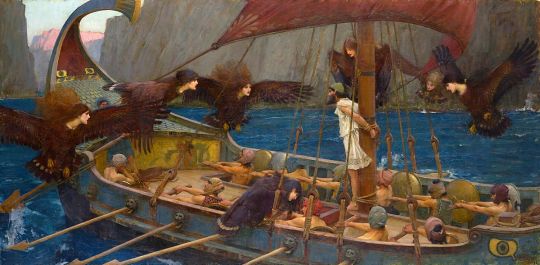
Sirens first appear in the literary record with the Odyssey (written around 750 BCE) in a segment that’s much briefer than you’d think considering the cultural impact of these mystical, singing creatures. It goes like this: Odysseus, warned by the enchantress Circe of the danger posed by the Sirens’ song, orders his crew to stuff their ears with wax. But, curious to a fault, he has himself bound to the ship’s mast so he can listen without flinging himself into the sea. The Sirens promise him tales of all that had occurred during the war at Troy, and everywhere else besides; enchanted, he begs his crew to release him. He rants, raves, and threatens, but to no avail. His crew sails on until the song fades in the distance, and so saves his life.
Homer doesn’t describe the Sirens’ physical appearance in his epic poem, Wilson says. But in ceramic paintings and tomb sculptures from the time of writing, and centuries after, Sirens were usually depicted with taloned feet, feathered wings, and a beautiful human face. The bird-body of the Siren is significant to Wilson: In the eyes of traditional peoples all across Europe, birds were often graced with an otherworldliness associated with gods, spirits, and omens.

They inhabit the water, the air, and the earth. They’re also associated with song; they have voices that are not human voices, and kinds of movement that are not the same as human kinds of movement.
The Sirens’ role in tomb art is particularly telling. In ancient Mediterranean and Middle Eastern cultures—as far back as 7,000 years ago—birds were often depicted carrying spirits to the underworld. In Southern Italy's Calabria, archaeologists unearthed several Greek askos (unguentary vessel) in shape of sirens, most commonly found in tombs.
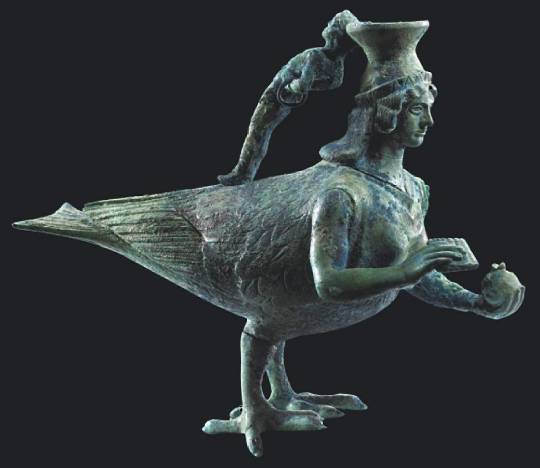
Bronze askos in the shape of a siren (5th century BC) from Crotone, Calabria, Italy - Archaeological Museum of Crotone.
Jump ahead a few millennia to 1,550 BCE, by which time Ba-birds, depictions of departing souls as human-faced birds, began appearing in Egypt. That connection between birds and dead souls seems to have then hopped over to Greece: Writing in the 5th century BCE, the playwright Euripides described the Sirens as at the beck and call of Persephone, one of the rulers of the underworld, while other writers identified the Sirens as rivals and dark echoes of the Muses, those goddesses of creativity.
These are the Sirens the Ancient Greeks would have recognized: bird creatures of the underworld, bridging the human world and what lies beyond. The Sirens—and their fateful songs—then offered a glimpse behind the veil, a chance to hear how earthly glories would echo in eternity. The question of what song the Sirens sing, what is this forbidden knowledge, what's wrong with it, what's the temptation—the text leaves a lot of open space there. Therein lies the seduction.
Yet today, mermaids or beautiful sea nymphs replace the dark, winged Sirens of ancient times.
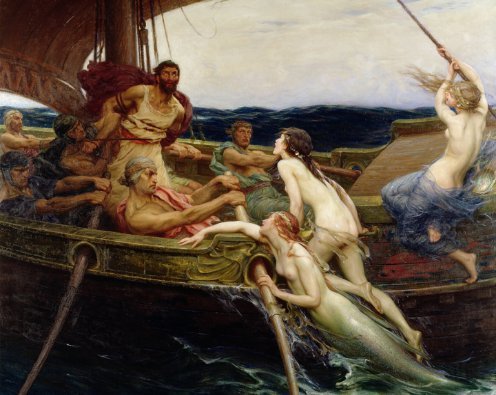
It is during the Middle Ages that the image of the siren began its shift from bird-woman to mermaid . With the transformation of the siren's image, the attributes associated with female monsters shifted. This suggests a change in the traits that were considered monstrous in women. The siren's movement from a frightening bird-woman to a beautiful mermaid represents female beauty becoming monstrous. Throughout the Middle Ages sirens increasingly represented a male fear of female seduction, suggesting a growing fear of female sexuality.
For medieval Christians, sirens were heavily associated with female sin.
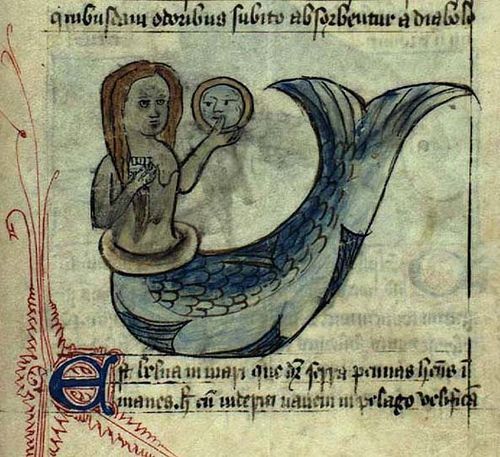
However it happened, the identification of Sirens with mermaids seems to have affected later translations of the Odyssey, and ultimately common knowledge of Sirens. Translators in the 19th and 20th centuries cast the Sirens in a sexualized light. In one prose translation, the Sirens speak of “the sweet voice from our lips,” despite the word στομάτων directly translating to the less sensual “mouths.” Another adds flowery descriptors of “each purling note/like honey twining/from our lips.” But unlike the Odyssey’s other island temptresses, Circe and Calypso, the Sirens get no admiring description of their faces or hair. Only their voice is described, and their field of bones and flowers.

That’s a pretty strong indicator that the Sirens are not meant to be read as offering a sexual temptation. You can kiss lips; mouths devour.
Folklore and mythology move on, given enough time. Today, the Siren is just another word for mermaid, and is likely to remain so. But there’s something richly thematic about the Sirens of Classical Greece that deserves to be remembered: in-between creatures on a lonely island, floating between the boundaries of life and death, and offering an irresistible song of both. Water-temptresses are a dime a dozen; the Sirens offer wisdom.
Follow us on Instagram, @calabria_mediterranea

#sirens#calabria#homer#italy#italia#south italy#southern italy#mediterranean#mediterranean sea#the odyssey#ancient greece#greek#greek art#art#terracotta#greek mythology#greek myth#underworld#mermaids#mythological creature#magna graecia#magna grecia#locri#folklore#mythology#siren#mermaid#crotone
87 notes
·
View notes
Photo

“In discussing all these diverse images of armed and actively fighting women of Old Norse literature, and in critically acknowledging that many of the accounts that concern them were created several centuries after the events, it is easy to relegate them all to the sphere of fiction and to regard them as having no basis in historical reality whatsoever. But if we turn to other medieval sources, created independently of Old Norse literary tradition and stemming from different cultural milieus, we will find within them very similar patterns of the occasional female participation in martial activities. The two case studies reviewed above – namely that of Æthelflæd of Mercia and of the women who fought in the siege of Dorostolon – strongly support the idea that there could be some reality behind the stories of armed women that survive in Old Norse literature. Also other historical women of the Viking Age, especially those who stemmed from the highest echelons of society, were occasionally compelled to engage in endeavours associated with warfare and would oversee military operations. For instance, the great Princess Olga, who was the wife of Igor of Kiev, led her army against the Slavic tribe of Derevlians, devised her own impressive strategies and through all these initiatives gained recognition among her companions, regardless of her biological sex.
It thus feels highly unlikely that all these medieval accounts, including the famed descriptions of female warriors in Saxo Grammaticus’ Gesta Danorum, were only inspired by legends of the ancient Amazons and served as curiosa and literary embellishments to entertain the audience. As we shall see in the following chapters of this book, archaeological finds from across Scandinavia provide support for the idea that some Viking Age women did wield weapons and in one way or another found their place in the martial sphere.”
Women and Weapons in the Viking World: Amazons of the North, Leszek Gardela
#warriors#warrior women#history#women in history#women's history#viking women#shieldmaidens#vikings#medieval history#scandinavian history#historyblr
86 notes
·
View notes
Text
had to turn back to tumblr after a year of not using it to hate on the new atla adaptation
a few things
speedrunning through half of the story with the fire nation family is not a good idea, actually. lu ten was introduced far too early, and with it you delve into iroh's backstory, motivations and true character before you've even fully developed the whole 'silly old spiritual man who prefers tea and hanging out with his nephew over hunting down an 11-year old air nomad'. the lu ten funeral scene was fine as an addition, but it's not something for book 1. learning about lu ten is something we do in book 2 as it compliments the developing relationship between iroh and zuko with the fire nation as a whole. also, iroh seems a lot less cool. the show commits the grievous literary sin of always telling rather than showing, and by continuously telling us 'he's the famed general iroh, dragon of the west' you're not actually accomplishing anything. let him redirect some lightning you fucking cowards.
azula also seemed to exist for no reason. any of the correspondences to azula from zhao could have bypassed her entirely and could have gone straight to ozai or even the fire sages. she exists in season 1 purely to rush through explaining zuko and iroh far too early. the show exists as a guideline. FOLLOW THE GUIDELINE. THE GUIDELINE IS GOOD. EVERYONE KNOWS THE GUIDELINE IS GOOD. also make her fire blue. cowards
aang does not waterbend for the entire season, which means the window of opportunity for him to learn to bend the other elements before the arrival of sozin's comet is even shorter than in the original show. even the original aang, who the netflix adaptation changed because he was 'too childish and always goofing off instead of getting to the point' understood his responsibilities to learn the elements better than this new live action version - part of the reason for the gang to get to the northern water tribe was to find aang a teacher (not just katara), master pakku, because katara was not capable of teaching him at her novice waterbending level but even so they were still seen practicing together on multiple occasions.
this brings me to my next point. WHERE THE FUCK IS JEONG JEONG. aang in the original series understood the urgency of defeating the firelord before sozin's comet after speaking to roku very early on, not as late as depicted in the adaptation. currently, the gang don't even know that they're on a time crunch, and yet still the show refuses to let them take their time by going on side adventures. this leads into the episode where aang meets jeong jeong and tries to learn to firebend before he's even started earthbending at all, because he's still scared that he only has a year to master the elements. he burns katara while trying, which is the reason she learned she had the power to heal with her waterbending, we see how fucking sick jeong jeong is at firebending for the first time during the fight with zhao, and aang swears off learning firebending at all, which is one of his main points of conflict leading all the way into book 3. if we skip that whole episode, we have skipped meeting one of the members of the order of the white lotus. the show could think it's slick by omitting him to just have iroh as the white lotus' firebender, but that's possibly one of the worst changes they've made. the deserter was not a filler episode.
i know a lot of people were talking about this before the show even came out, but sokka is not sokka. in book 1, sokka is three things - funny, overconfident and sexist. in the live adaptation, he is kind of one of those three things. part of why sokka's arc is one of my personal favourites from the original show is the stark change you see from the start to the end of his story - he believes himself a leader but has no real tactical or combative experience despite telling all the fighters and warriors he meets about how impressive he is. and then at the end of the show he is a definitively strong leader, shown by leading the assault on the fire nation armada - his team being two of the show's most competent female characters, who he trusts and respects with his life. by omitting these traits from sokka's character, you remove a big part of why he's even there in the first place - his arc's beginning allows him to become the fearless leader that lead his team to defeating the fire nation army.
i also hate that aang meets monk gyatso in the spirit world. a big part of aang's conflict about running away is that there exists nobody in the world who can tell him that what happened to the air nomads was not his fault, and that there was nothing aang could do to stop it if he was there. the new adaptation decides against the inclusion of one of aang's primary internal conflicts by changing the 'running away from his responsibilities as the avatar because he's a terrified child' to 'getting some air', and then throws in meeting the spirit of monk gyatso to tell him all of these things that aang needs to learn on his own. once again, telling rather than showing.
and finally, my least favourite change - the agni kai. part of the reason why i personally think the agni kai is so significant to zuko's story is the fact that zuko intentionally refuses to fight. in the adaptation, zuko fights back against his father, and his father scars him simply because zuko hesitates. in the original series, zuko bows to his father and pleads for mercy, and refuses to fight at all, and that is when it cuts away to iroh and azula's very differing reactions to the altercation, zuko screaming in the background. the setting also irritates me, because in the original, the agni kai was a public spectacle for hundreds to see in an ominous chamber, while in the new show it looked like just a regular old family gathering in the sun. zuko's adaptation scar i also hate because it doesn't even look like a scar. it looks like a birthmark, or at best, a black eye. if you hadn't seen the original, you would only know that it's a scar because the show tells you that it's a scar. zuko's scar in the animated series is a definite physical deformation of his face, his face looks red and raw, and his eye is smaller likely due to how the tissue healed, and as the show goes on you learn that the severity of his physical scars reflect the severity of his emotional ones. the original show does a brilliant job at showing how, just through the scar and the banishment alone, that despite zuko's beliefs, his father has betrayed him time and time again.
84 notes
·
View notes